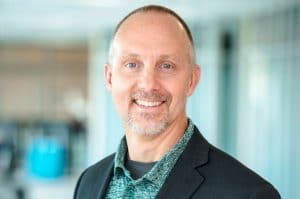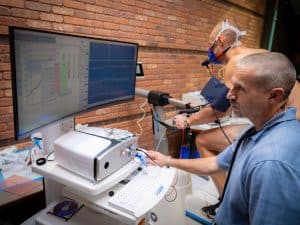National Institutes of Health award for $7.7 million to determine how people over 60 attain the health benefits of exercise
Published 10.01.24
Dr. Marcas Bamman has received a $7.7 million award from the National Institutes of Health (NIH) for a clinical trial to determine how people age 60 and older attain the health benefits of exercise.
Bamman is a Senior Research Scientist at the Florida Institute for Human and Machine Cognition (IHMC) who leads the Institute’s Healthspan, Resilience, and Performance team.
This new project is called “Multidimensional Predictive Modeling to Understand Mechanisms of Exercise Response Heterogeneity in Older Adults.” It is a collaboration with the Oklahoma Medical Research Foundation and the University of Florida.
“This type of research is what the new Healthspan, Resilience, and Performance Research Complex was built to sustain,” says IHMC’s CEO and Founder, Dr. Ken Ford. “We anticipate that this research will foster significant advances in the understanding of the factors that impact the variability of response to exercise among older adults.”
Age-related functional declines are thought to be caused by hallmark biological processes that compromise healthspan and quality of life, says Bamman.
“Exercise is a potent treatment with promise to mitigate most aging hallmarks, but there is substantial variability in individual exercise responsiveness,” Bamman says. “This project will help us begin to understand what underlies those differences in responsiveness.”
The project will combine endurance and resistance training in alignment with public health guidelines to better understand variable exercise responsiveness in older adults with the goal of improving each older adult’s capacity to attain the many health benefits of exercise.
This inter-individual response heterogeneity was first identified in the context of endurance training and later was established with resistance training by current members of the IHMC team nearly 20 years ago. IHMC’s team has proposed the innovative, but logical, strategy to use combined endurance training and resistance training to maximize health benefits in aging adults.
Low cardiorespiratory fitness and low functional muscle quality are manifestations of the deterioration caused by cellular aging. Importantly, both conditions are modifiable with endurance training and resistance training.
The 2-phase trial, being managed by Senior Research Associate Craig Tuggle, will recruit up to 250 people ages 60 and up for a 23-week study period.
“We know that exercise is a bit of a miracle drug,” Tuggle says. “But we want to explore and better understand the variability in responses people have to it.”
Participants will be put on a protocol of endurance training and resistance training three days a week in Phase I. For Phase II, some will receive targeted augmentation (a boosted exercise prescription and free-living recommendations) while others will continue the Phase I endurance and resistance training protocol.
Recruitment of participants is likely to begin in late 2024 or early 2025.
IHMC is a not-for-profit research institute of the Florida University System where researchers pioneer science and technology aimed at leveraging and extending human capabilities. IHMC researchers and staff collaborate extensively with the government, industry and academia to help develop breakthrough technologies. IHMC research partners have included: DARPA, the National Science Foundation, NASA, Army, Navy, Air Force, National Institutes of Health, IBM, Microsoft, Honda, Boeing, Lockheed, and many others.
Latest News
- David Bear joins IHMC Board of Directors
- STEM-Talk: Michael Schmidt on building a space-faring civilization
- Florida Blue award supports health and wellness research and outreach at IHMC
- STEM-Talk: Ken Forbus on AI and his development of the Structure Mapping Engine
- STEM-Talk: Pascal Lee on returning to the Moon — and heading to Mars
- Aging Symposium draws experts to IHMC
- IHMC hosts Fredric G. Levin Lung Care Symposium March 27-28 in Pensacola
- Humanoid robotics and exoskeletons lead latest IHMC newsletter
- Celebrate Robotics Week at IHMC Open House on April 11, 2025



